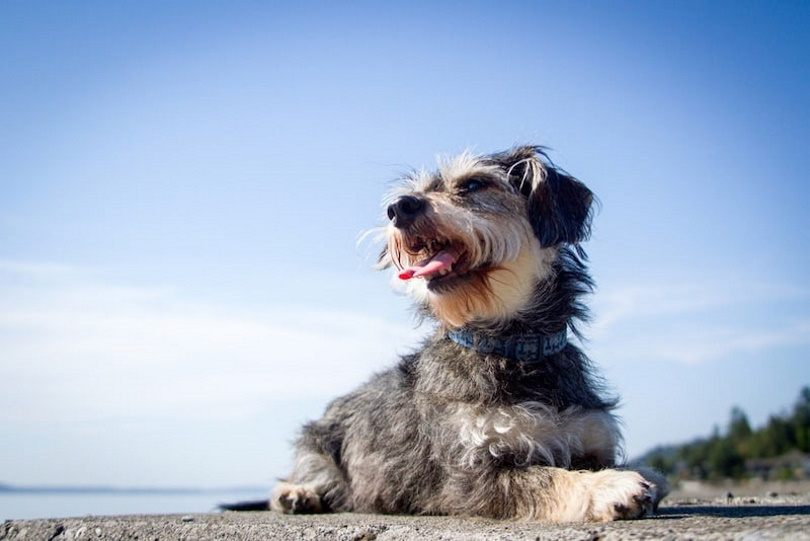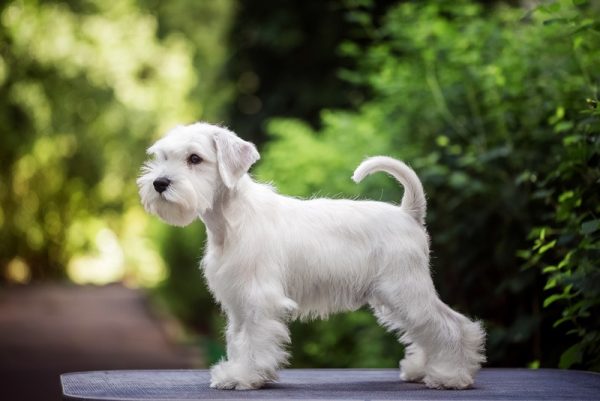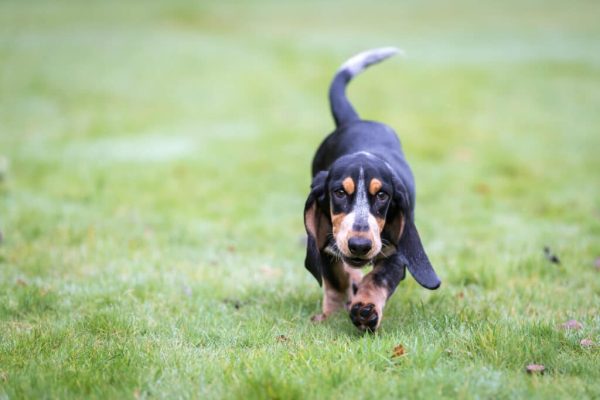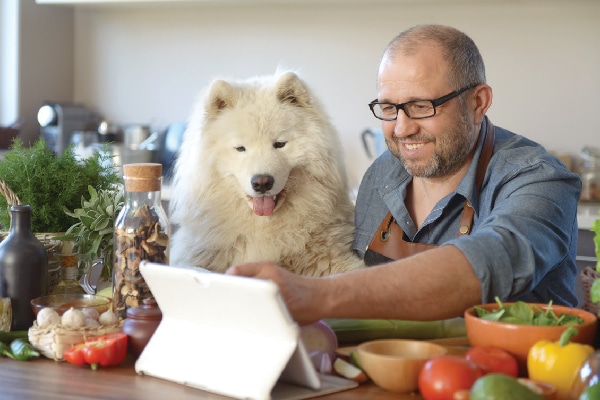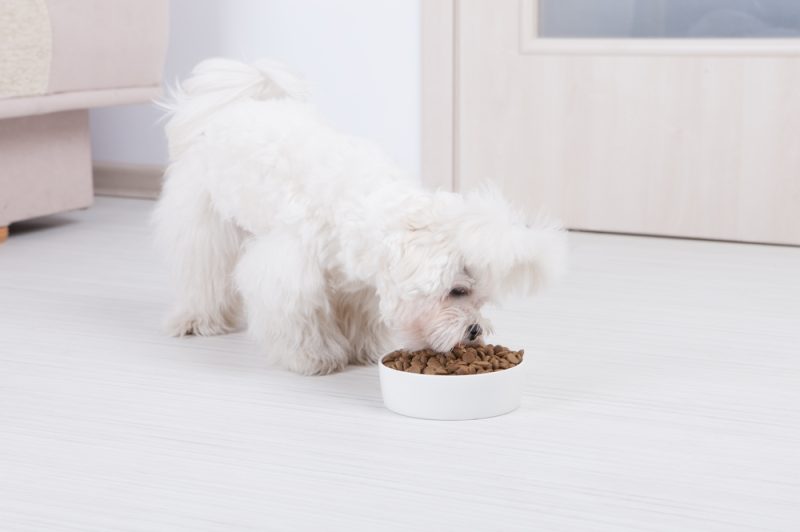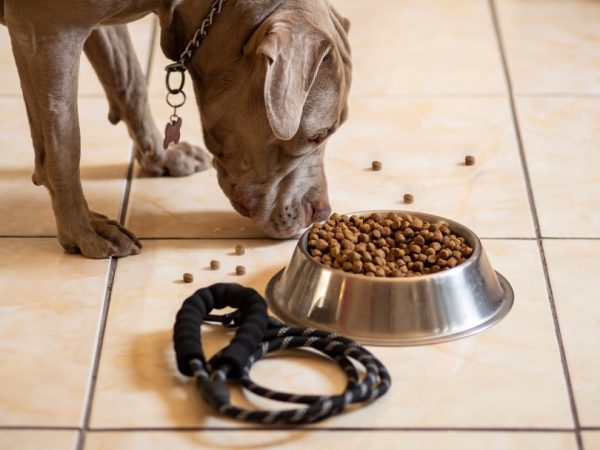In this article
View 8 More +The Miniboz is a cross between a Miniature Schnauzer and the Boston Terrier. As a mixed breed, they can vary quite a bit. You never know what traits a mixed puppy is going to inherit from their parent breeds.
That said, these dogs do tend to be small- to medium-sized dogs. Typically, they weigh 15 to 25 pounds, which puts them in between the small and medium categories.
Breed Overview
Height:
12–17 inches
Weight:
10–25 pounds
Lifespan:
12-15 years
Colors:
Black, brown, gray, fawn, Isabella,
Suitable for:
Families looking for a laidback, affectionate dog
Temperament:
Gentle, people-oriented, friendly
Typically, owners describe this dog as fun-loving and playful. They are companion animals, first and foremost. However, that doesn’t necessarily mean that they’re great for all families. Their Schnauzer lineage can make them a bit sensitive, so they aren’t always best with children.
They do tend to be healthier than the Boston Terrier. The Miniboz’s snout isn’t nearly as squished, so they aren’t nearly as brachycephalic.
Miniboz Characteristics

Miniboz Puppies
Miniboz puppies are quite difficult to find. Many mixed-breed dogs have become more popular over the years. However, this particular mixed breed is not one of them. There are not many breeders who produce this sort of dog, so you often have to look long and hard for them. These dogs are not incredibly sought after, which helps keep their prices down. However, this also means that it is difficult to find breeders producing these puppies at all. You can also search in your local animal shelter if they have Miniboz or similar mixed dog breeds that are looking for a new home.
Miniboz dogs tend to be gentle and friendly. They love to play with people, and they create strong bonds with their families. Keep reading the Miniboz’s full care guide to know what type of care they need in terms of diet, exercise, grooming, and more!
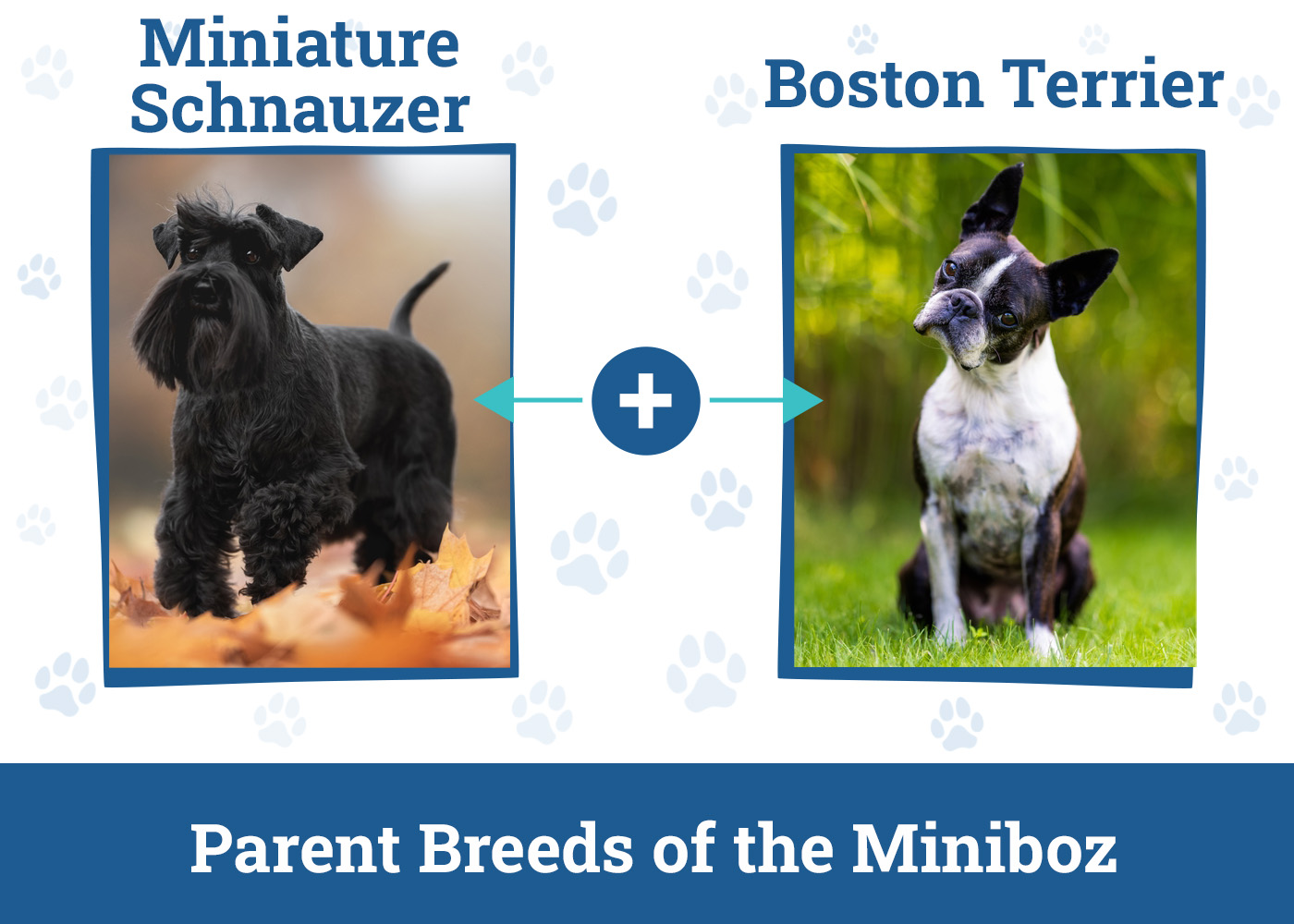

Temperament & Intelligence of the Miniboz
Exactly what your Miniboz acts like will vary. As a mixed breed, these dogs do not have a specific temperament. Of course, how you raise them is also essential beyond just the genetics that they inherit from their parents.
Often, these dogs are described as friendly and outgoing. They’re people-oriented and it is usually quite obvious. You can expect them to greet just about everyone they meet with licks and a wagging tail.
Of course, socialization is vital. Without it, these dogs may not be nearly as friendly as you’d hope.
While these dogs are incredibly active, they are extremely playful. They basically like to do anything that involves their people, which will include playtime. However, that doesn’t mean that these dogs enjoy longer hikes or more physical activity. They like being with their people, but maybe not that much!
As long as their activity needs are met, these adorable dogs are fine lounging around at home with their people. They love affection and can be a bit destructive if they don’t get it, though.
Due to their people-oriented nature, they can be more prone to separation anxiety. For this reason, we highly recommend incorporating crate training into their daily routine from an early age.
Generally, these dogs are highly recommended as family animals. However, it does depend on the type of dog that you’re looking for. Without proper socialization, these dogs can be quite snappy. Therefore, be sure that you get them around many different people at a young age.
Are These Dogs Good for Families?
The Miniboz is a great family dog, especially if they are on the larger side. As people-oriented animals, these canines generally get along with everyone in their family. They are not one-person animals by any means! Instead, they usually love everyone, family and strangers alike.
That said, smaller dogs can be a bit wary of children. Children can more easily hurt the smaller Miniboz dogs, which can cause snapping and future fear-based aggression. These dogs may be solidly built and friendly, but they typically won’t be accepting of children if they think that they’re going to get hurt.
Therefore, it is essential that you socialize this dog with well-behaved children from a young age. Of course, all interactions between this breed and children should be supervised. Your goal should be to step in before either party gets hurt.
Does This Breed Get Along With Other Pets?
The Miniboz is completely fine with other dogs as long as they are socialized properly. Take them around dogs at a young age to improve their social skills, and they should continue to get along with other dogs swimmingly.
Usually, these dogs are perfectly fine with dogs that they grow up with. However, they can be a bit territorial toward strangers if not socialized correctly.
This breed usually doesn’t have strong prey instincts. Therefore, they can get along fine with cats and other animals. They won’t continuously chase them like some other breeds.
That said, socialization is still important. A Miniboz will chase a cat if they’ve never seen one!

Things to Know When Owning a Miniboz:
Food & Diet Requirements
The Miniboz is not prone to any nutrition-driven health problems. Therefore, they typically don’t require any specific diet.
Like all dogs, they can become obese if they eat too much and don’t exercise enough. Obesity is extremely common in dogs and can lead to a whole list of health problems.
Since this breed tends to be rather laidback, it is easy for them to eat too much and exercise too little. They are also extremely food-driven, so it isn’t odd for them to beg for food constantly. Therefore, we highly recommend keeping an eye on their body condition.
If you notice your Miniboz becoming overweight, it may be time to speak with your vet. You may need to switch them to a special food that can help them lose weight. Exercise is the other essential part of their weight-loss journey.
Exercise
This breed does not need massive amounts of exercise. Generally, they’re laidback and small in size. Therefore, they are great for families that don’t have the time or desire to exercise their dogs regularly.
Typically, these dogs only need about two walks a day. You can trade these walks with playtime, especially if it is in a fenced-in backyard. The important part of these exercise periods is that they get your dog’s heart rate up and wear them out, not necessarily what they’re doing during them.
As a people-oriented breed, this dog typically likes to do just about anything that their people are doing.
When left to their own devices, these dogs usually won’t get enough exercise. You may put them in a fenced-in backyard for a time, but you can’t expect them to actually move around and get enough exercise by themselves.
This fact is especially true as they get older. In many cases, these dogs would much rather sit and do nothing rather than run around — unless you encourage them, of course!
Training
Neither the Schnauzer nor Boston Terrier is particularly trainable. Therefore, it is unlikely that their mixed-breed puppy will be. However, that doesn’t mean you should avoid training altogether. With the proper technique and plenty of patience, these dogs can learn basic commands and a few others.
That said, you never really know what you’re going to get with a Miniboz.
The Boston Terrier isn’t the most intelligent dog in the world. They require more repetitions and are often more difficult to train simply because they take a bit longer to “get” it.
On the other hand, the Schnauzer is quite attentive and intelligent. They can learn commands extremely easily, so much so that they often get bored during sessions. It is more common for a Schnauzer to ignore a command because they’re bored than because they don’t get it.
Since both parent breeds are on either side of the training spectrum, your Miniboz can land almost anywhere. They may be extremely intelligent but bore easily, or they may need many repetitions. The only way to know is to start training your dog and to pay close attention to their body language.
If the dog appears bored or distracted, you may need to ramp up the intensity. If your dog is paying attention but still not getting it right, they likely need more repetitions.
We highly recommend getting these dogs into puppy training classes as quickly as possible. They will benefit from the social aspect of these group classes, and working with a trainer can help you figure out exactly how to train your new puppy.
Grooming ✂️
Luckily, these dogs won’t need extensive grooming no matter which parent they take after. However, they will require regular grooming.
They may have a single coat or double coat, depending on which parent they take after. Either way, they will need to be brushed a few times a week. This brushing session will remove much of their excessive hair and dirt.
Their coat may need to be hand-stripped. If they have a Schnauzer-like coat, we recommend working with a professional to do so. Once you do this, their coat can be maintained for quite a while just by keeping them brushed.
You shouldn’t have to wash these dogs regularly. If you keep up with their brushing sessions, their coat does a good job of keeping itself clean. In many cases, their coat will even be dirt and water-resistant.
That said, if they have a double coat and you decide to clip them, much of this resistance will be lost. A clipped Miniboz is actually more prone to shedding and getting dirty. For this reason, we don’t recommend it.
Health and Conditions
The Miniboz is decently healthy. They aren’t prone to many of the genetic health conditions that bother their parent breeds.
They can be a bit brachycephalic if their snout is shorter. The Boston Terrier is extremely brachycephalic, which makes them prone to heat exhaustion, anesthesia problems, and similar issues. However, this mixed breed usually has a bit of a snout due to their Schnauzer parent.
If you want a healthier dog, we recommend choosing a dog that has a longer snout.
This breed is similarly prone to patellar luxation. This condition involves the kneecap sliding out of place, usually repeatedly. The dog can often “kick” the kneecap back in by pushing their leg out sideways, which is actually a way to tell if your dog has this condition.
However, if the kneecap pops out too much, it can cause arthritis and other problems. Sometimes, the kneecap can’t get put back in place and ends up getting stuck somewhere else. Surgery is sometimes required to correct the condition, which involves making the groove that the kneecap sits in deeper.
Occasionally, these dogs can get glaucoma. This eye condition is most common in older dogs, but it may appear in your Miniboz earlier than you’d expect. Luckily, this condition is quite treatable if caught early. However, it does lead to blindness in about 40% of dogs.
- Brachycephalic
- Obesity
- Patellar luxation
- Glaucoma
- Cataracts
Male vs. Female
There isn’t a significant difference between male and female Minibozes. For the most part, the genes they inherit and how they are raised have much more to do with their personality than their sex. Males are also not particularly larger than females. You’ll find males and females on both the small and large ends of the spectrum.
Of course, these dogs will exhibit a few differences in sex due to their hormones. Females will go into heat, while males will tend to mark their territory.
In the same vein, males tend to wander more, while females may only wander when they are in heat. Males may disappear and display weird behavior when they smell a female in heat.
It is also more expensive to get a female fixed than a male because they must undergo more extreme surgery. However, this cost factor isn’t so significant that it should affect which puppy you get.

3 Little-Known Facts About the Miniboz
1. They vary significantly.
You never know what puppy is going to inherit what genetics from what parent. Therefore, we highly recommend not adopting one of these puppies unless you’re willing to handle a few unknowns.
2. Socialization is essential.
Boston Terriers are often known as some of the friendliest dogs around. However, the Schnauzer requires a bit of socialization because they tend to be devoted to their people and not everyone else. You don’t know what camp a Miniboz will fall into. Therefore, you should plan on socializing them plenty, just in case.
3. Minibozes tend to be quite healthy.
Boston Terriers are not healthy dogs. However, this mixed breed does tend to be healthier. Their snout isn’t nearly as squished as that of a purebred Boston Terrier, so they don’t have the same breathing problems.

Conclusion
The Miniboz is a family dog through and through. They love their people and are devoted to their families. However, they love just about everyone. When socialized properly, they will shower everyone with attention and doggie kisses.
Usually, these dogs are extremely low-maintenance. They need about two sessions of moderate exercise a day, which can be a walk or a play session. As long as the dog gets moving, it counts!
They typically only need to be brushed a few times a week. They do shed a bit, but not nearly as bad as some other breeds. Of course, it does depend on what parent they take after. Schnauzers tend to shed less than Boston Terriers.
We highly recommend these dogs for new and experienced owners alike. They get along with children and other pets of all sorts, assuming that they are introduced to them at a young age.
See also:
- Chonzer (Bichon Frise & Miniature Schnauzer Mix)
- Crested Schnauzer (Miniature Schnauzer & Chinese Crested Mix)
- Miniature Schnoxie (Dachshund & Miniature Schnauzer Mix)
Featured Image Credit: Raindog Photography, Shutterstock
